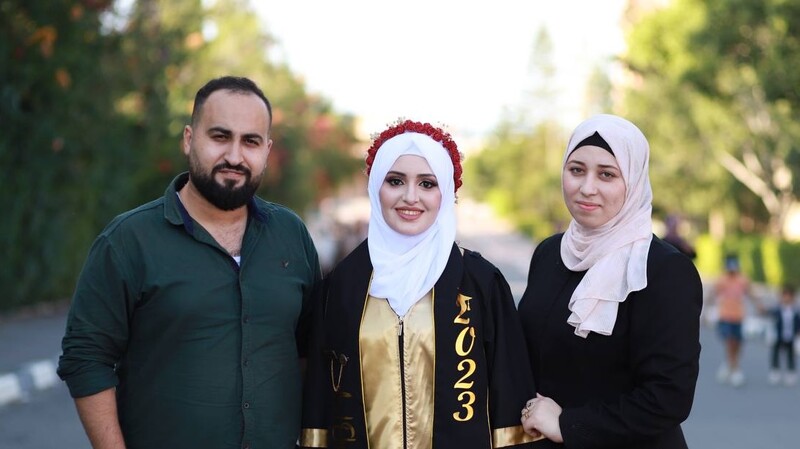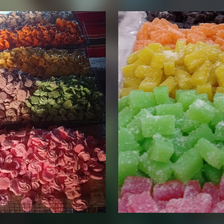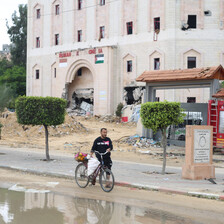The Electronic Intifada 10 October 2024

From left to right: Ahmed Bardawil, Aseel Mousa and Haneen Draibieh, in 2023, on Aseel’s graduation day.
Aseel Mousa, 23, lost more than her uncle the day Ahmed Bardawil was killed.
She lost a lifelong companion, a protector and a man she considered a second father.
The kindest thing he ever told Aseel, when she was upset or had a problem, was “your tears are precious to me, my dear.”
Aseel recalled that “he would cry too and say, ‘I miss you so much, my dear, it’s been two months since I’ve seen you. I wish you could come back to the north.’ But it was too late. By then, the borders were sealed.”
Their last moments together were during Aseel’s graduation celebrations on 6 October 2023, just after she had received a degree in English language and literature.
“He was so proud of me that day,” Aseel said. “He and [his wife] Haneen celebrated with me like it was their own joy. He was happier for me than I was. I’ll never forget that moment – seeing him so proud.”
Just one day later, everything changed.
From celebration to devastation
On 7 October last year, Aseel woke up to find her graduation gown still draped over the couch. Aseel’s home in Gaza City’s Sheikh Radwan neighborhood was destroyed by an Israeli airstrike three days later.
“We barely made it out alive,” she said. “We couldn’t take anything with us – no clothes, no memories, nothing. Just ourselves.”
“It felt like my world flipped overnight. One day I was celebrating; the next day we were fleeing for our lives.”
Aseel and her family were forced to flee north on 13 October 2023, seeking refuge in Deir al-Balah, where they lived in a tent.
The once bright future Aseel dreamed of after her graduation now felt like a distant memory.
“Everything I worked for, the life I was so proud of disappeared in an instant,” she said.
Despite the destruction of her home, the loss that devastated Aseel the most was the martyrdom of Ahmed, who was killed by an Israeli airstrike on 6 December last year.
“The pain of losing our house is nothing compared to losing him. If he had survived, everything else – the war, the destruction – would have been easier to bear,” Aseel said.
Ahmed, 30, was a devoted husband to Haneen and a loving father to his two daughters, Zeina and Lynn. He had just completed his master’s degree and was preparing to pursue a doctoral degree in Sudan, but the ongoing Israeli genocide had prevented him from traveling.
In December 2023, as the war escalated, Aseel and her family were forced to flee again, this time to the south of Gaza. Ahmed, Haneen and their two daughters stayed behind in northern Gaza.
“Ahmed begged us to come back,” Aseel said. “But we couldn’t. We were trapped in different worlds.”
Ahmed expressed his fears to Aseel.
“I’m afraid to die. I want to live, to survive with my wife and daughters,” he told her.
His words still haunt Aseel.
Paralyzed by grief
On the night of 6 December 2023, Israeli forces made a chilling phone call to a local journalist, Mo’men al-Sharafi. They informed him that the residential block where he lived with his family would be destroyed.
At 3 am, the airstrike hit Jabaliya, Block 2, decimating the area where Ahmed Bardawil and his family had sought refuge. The explosion leveled the homes, burying Ahmed, Haneen, their daughters Zeina and Lynn, her parents and siblings.
Twenty-one members of al-Sharafi’s family were killed in the strike.
Aseel received the devastating news the same day. Her mother’s reaction was to scream: “What will I tell my mother and father?”
Her mother’s heart stopped three times from the shock, requiring resuscitation. “We had to give her strong sedatives. She couldn’t handle it,” Aseel said.
She, too, was paralyzed by grief, later recalling that her mind was stuck on Ahmed’s last words, how he wanted to live.
The only survivor of the family was Haneen’s sister Khadija, who lives in Belgium. She gave birth to a daughter just two weeks after her loved ones’ deaths and named her Farah after her martyred sister.
“I didn’t even get to say goodbye,” she said, her grief amplified by the distance and her new motherhood.
A neighbor’s solemn vigil
One of the neighbors who had survived the Israeli attack started coming to the ruins daily, speaking softly to the lifeless bodies under the rubble.
“I would talk to them,” said the neighbor, who requested anonymity, “but they never answered.”
He said he saw it as his duty to keep them company, to ensure they were not alone, even in death.
It took weeks to recover the bodies, and even then, a proper burial was impossible, as Israeli soldiers had occupied the cemetery. They were forced to bury the family under the pavement in the street.
Months later the bodies were moved from the street to a cemetery, where proper graves were dug. Khadija asked those who transferred the remains of her family members to the cemetery to dig a grave for her beside theirs, so she could be buried there one day.
“I want to have them around me,” Khadija told Aseel.
Life after great loss
Since the killings of Ahmed and his family, Aseel said life has lost all its color.
“Everything feels black now. My life used to be full of colors, but now it’s all just dark,” she said.
The laughter that once filled her home has been replaced with silence.
“When Ahmed and Haneen visited, the entire neighborhood would say, ‘We knew they were at your house from the sound of your laughter.’ No one made us laugh more than when they were around,” Aseel said.
For Aseel, the pain of losing her uncle and her best friend has left a wound that will never heal.
But she clings to the memory of their laughter, their love and the moments they shared, even in the darkest of times.
“I miss them so much,” she whispered. “More than words can say.”
Jumana Taiseer is a writer and a translator from Gaza.




